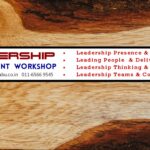Mastering the art of asking questions not only enable a leader to make right decisions but also enhance one’s leadership and to be an independent thinker. In this article my aim is to explore how mastering the art of asking questions makes one effective as an individual and effective in leadership.
When a leader asks right questions not only get the right answers but also the right response. A right question asked at the right time gives birth to revolution. Right questions asked at the right time have the power to provoke people to act differently, enlighten people to think in new direction, empower people to focus on right things, unearth hidden truths, illuminate new ideas and gain useful insights to make effective decisions.
There are two kinds of leaders: those who operate from “I know everything” mode and others who operate from “Discover” mode. Those who operate from “I know everything” mode are less likely to ask questions for they have readymade answer for everything and ensure everyone falls in line with their answers. Those who operate from “Discover” mode are seekers who are in quest for something better and effective all the time, they ask questions, they not only are able to see things differently and gain new insight but also enable others to see things differently, by doing so empower them to act differently.
Leaders may not have all the answers to every question asked, but they have the ability to find one whenever one is needed, they do so that by asking right questions. There are some who ask questions as a means to avoid responsibility, asking questions a means of seeking approval, consider asking questions a sign of weakness as though it is a presents one as incapable of making one’s own decisions.
Let’s look at how the art of asking question makes one effective as an individual and effective in leadership.
( To Know more about 3 Day Leadership Effectiveness Workshop Facilitated by Sudhakar I. Prabu Click Here or visit http://www.tpmc.in/lew.html )
Art of asking questions and independent thinking:
For leader to be effective one must be an independent thinker rather than be an approval seeker (there is nothing wrong in seeking approval, but when it is done to appease others then it may not make one an effective leader) and confirming to the conventional thinking. Confirming to the conventional thinking is broken when one learns to think independently, one develops an ability to think independently when one learns to ask questions.
Independent thinking is essential for making sense of what is going on instead of raiding on the wave and do things just because everyone else is doing. Mastering the art of asking question enables a leader to think independently and even enable one to act interdependently. When one learns to ask questions one learns to identify one’s own influencing factors. Asking questions brings hidden assumptions and bias to light, questioning believes and premises give birth to new and improved understanding of the situation, and enable one to make sense of what is going on and act accordingly. However one must not overdo it so much it have the negative impact of unsettling one’s self and plant a permanent doubt.
It takes an independent thinker to appreciate others who think independently.
Art of asking questions and decision making:
Leaders make decisions; they do so by making sense of what is going on and make sure what needs to be done. It takes an independent thinker to make sense of what is going on and take decision to what needs to be done. Right decision is what makes a leader effective and enables people and projects to achieving its objectives.
Questions are essential to gaining knowledge and understanding. Independent thinkers ask the right questions, right questions lead to right information. Right information enables one to make sense of what is going on and think through issues objectively and thoroughly. Thinking through issues objectively and thoroughly bring new insights and give birth to workable solutions, it improves one’s judgement and enable one to make right decisions.
Thoughtful decisions are effective only when the information used to reach conclusions are reliable and accurate and relevant. Asking right questions enable a leader to gain the needed perspective and useful objective information based on which one can make effective decisions.
Seeking information from others is not a sign of weakness nor gives away one’s responsibility. A leader has to make a final call, but there is no harm in seeking information from others, in fact it builds, makes things better, and empowers self and others to think and act differently.
Art of asking questions and leadership:
Independent thinking is essential for effective decision making, when a leader’s decision making style allows others to participate it empowers others as well as enables them to focus on right thinks.
There are some who ask questions just show how informed one is or to point out how much ill informed others are. Even some ask questions that give information or clues to feed listeners mind, to think in the way they want to think. They neither enable others to think differently nor empower others in any way.
When a leader asks questions it allows others to participate in decision making. Allowing others to participate in decision making have two prone effects on teams, they are: First, it gives them sense of value and gives them an opportunity to take active participation which has its own positive effects. And the other is, empower team members by enables everyone to reach the same level of learning and enable them to focus on the right directions.
Asking questions allow people to participate in discussion giving team members an opportunity to get involved rather than leader spelling out solutions and everyone else has to fall in line. Allowing team members to participate in decision making creates an environment where it enforces shared responsibility and enhanced ownership of decision made in groups.
A leader who ask question gives space for others to get involved, but it calls for a leader to have the openness and willingness to share not only responsibility of making decisions but also credit for the outcome. A leader’s openness to share responsibility and share credit impacts in a way that it creates an environment in which everyone is valued, it bines everyone together, challenges every one to share responsibility and take ownership of decisions they reached, promotes humility and teachability, encourages acceptance and appreciation of one another’s competence, and an environment where all can learn from one another.
Asking questions also empowers team members by helping them to focus on right issues and find right and important aspects and enables everyone to reach the same level of learning. Giving away readymade answers do not empower others but they enforce conformity and encourage dependency. It results in empowerment of individuals, inculcate in them the ability to deal with issues effectively and efficiently, in the absence of leader team members are capable of handling situations on their own instead of waiting for the leader to make decision.
Right qquestions engage people. Questions can persuade an audience, align an organization, set direction, or focus attention on the things that enable people to learn, which empowers people and enables them to think and act differently.
The Art of asking questions:
What kinds of questions one must ask to probe, and enable self and others to think effectively? It is not worth asking people whose answer doesn’t matter anyway. Use the following questions to probe, stretch one’s thinking, challenge conventional thinking, engage groups to focus on right things, give opportunity to participate and empower everyone to reach the same level of thinking.
- What, why, when, how, and how much?
- What is the context?
- Compared to what?
- What is missing?
- What is invisible and unobvious?
- What would work the best?
- What would they have done?
- What is lingering on in mind?
- Why only this, why not that?
- What more?
What more can we add to the art of asking questions and how it can improve one’s leadership effectiveness? It is for you to get involved and make this more useful for others who read this. Leave your comment.











